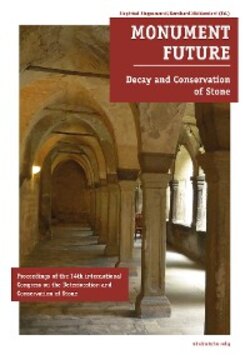Читать книгу Monument Future - Siegfried Siegesmund - Страница 163
Abstract
ОглавлениеThe weathering of natural building stones in the South of Mexico is mostly controlled by the influence of atmospheric and meteoric water, thermal stress and the input of salts from the environment. Twelve varieties of volcanic tuff rocks from South and Central Mexico were analyzed regarding their petrographical and petrophysical properties, as well as their weathering behavior. The tuffs show a broad range of properties and differential weathering behavior. Moisture properties like water uptake, water vapor diffusion and hygroscopic water sorption as well as hydric expansion and salt crystallization show great dependence on the pore space properties and the content of swellable clay minerals or zeolites. The deterioration during salt bursting tests is controlled by both salt crystallization pressure and hydric expansion. Especially zeolite-rich samples show intense water-related weathering. Their sorption values and hydric expansion are high, while capillary water uptake is comparably low. The clay and zeolite-rich tuffs furthermore suffer from intense shrinking and fracturing during drying. The very high hydric expansion superimposes the salt crystallization pressure and the effect of thermal dilatation.
